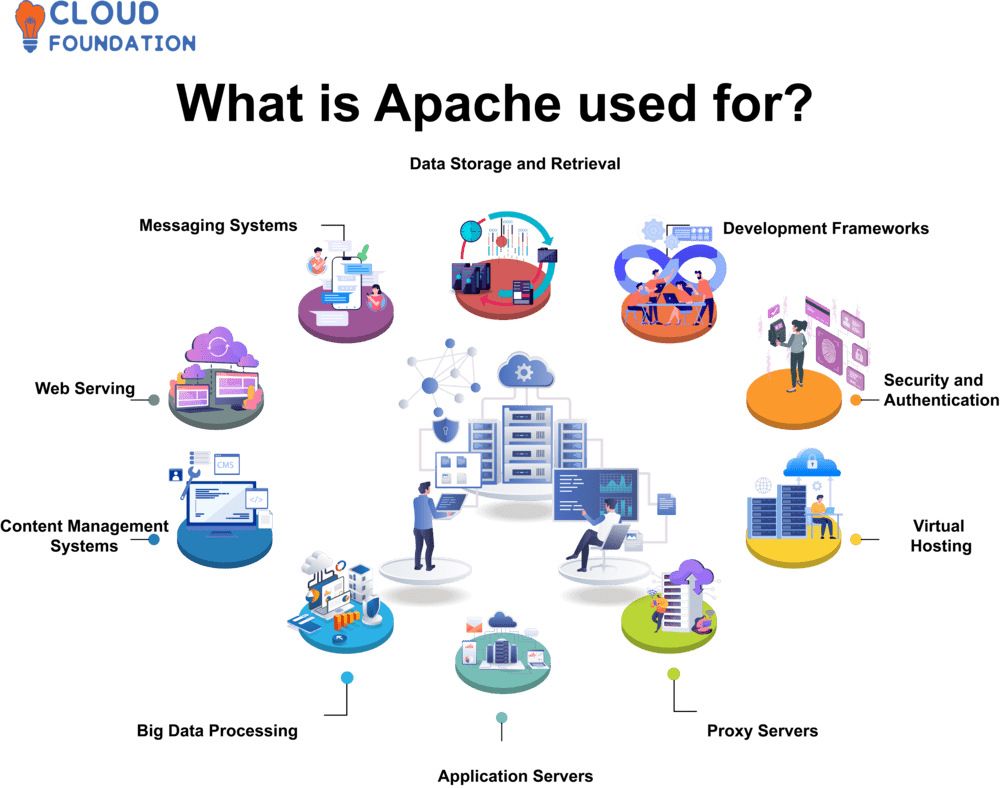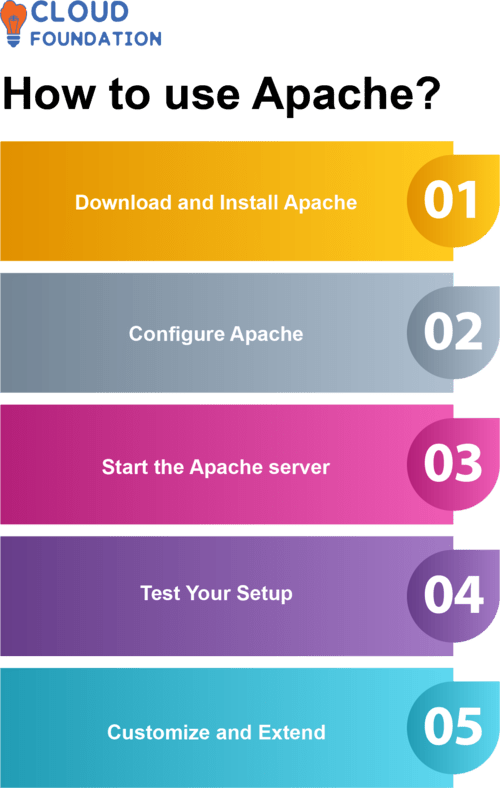What is Apache?
Any developer worth their salt in the digital space will tell you that Apache is the gold standard for hosting websites and services.
This blog will cover the fundamentals of Apache, from its many capabilities to the various applications to which it can be put.
We’ll also cover advanced topics like Apache’s architecture and security, beginner guides, and how-to. Please grab a coffee and sit back with us to learn more about Apache.
Overview of Apache, Introduction to Apache
Apache, an open-source software for server download and installation, handles Internet users’ web page requests.
According to estimates, approximately 70% of web servers currently in use were developed by Apache Software Foundation and managed through it. They’re responsible for keeping tabs and improving it!
Apache is a highly dependable, secure, and productive platform known for its reliability, security, and flexibility.
Ideal for hosting numerous sites at once while simultaneously serving web pages to visitors, Apache may also adapt software specifically tailored to each user.

At its heart is Apache, working closely with Dynamic Host Configuration Protocol and Mod Rewrite Module to rewrite URLs so only relevant material reaches users’ browsers.
In addition, Apache’s massively scalable infrastructure simultaneously supports users from diverse locations.
Additionally, Apache provides strong user security features, including restricting who can view specific parts of a website for what purpose.
In addition to modules that restrict which websites can connect with other networks and caching options for websites, Apache also features modules explicitly designed to limit this aspect of website hosting.
Overall, a unique platform that, being open-source software, allows extensive customizability while offering customers secure, trustworthy access to their websites.
What is Apache?
Here, beginners may learn how to use Apache, while advanced users can find tips and methods to maximize their experience.
Apache’s perks and more will be discussed. Join us to learn about this powerful web server and start your web server journey!
Apache is an influential open-source software foundation that assists in designing and maintaining many different software programs.
As such, people from around the globe come together in their effort to collaborate in creating software to address a diverse selection of issues.

The Apache Software Foundation (ASF) is home to various initiatives, with the Apache HTTP Server standing out as one of its greatest success stories.
Utilizing robust web server technologies known for their scalability, security, and dependability. It was first made widely available by ASF’s web server program: “Apache.”
Apache powers much of the internet today and serves as the default web server for millions of websites, serving millions more visitors daily.
It is widely recognized in software development communities due to its commitment to open-source ideals and numerous projects.
Apache Definition
Regarding web servers, Apache has long been one of the go-to open-source solutions. Today, over 100 million websites rely on it, making it one of the world’s most widespread servers.
Apache Web Server (Apache) is a cross-platform, free web server compatible with modern Windows, Mac OS X, and Linux operating systems.
Due to its scalability, dependability, and performance capabilities – as well as URL rewriting features such as parallel hosting or dynamic content management capabilities – it has quickly become one of the most commonly used server platforms worldwide.
Apache web servers have long been recognized as reliable, quick servers capable of quickly processing high volumes of requests.
When used correctly, they make excellent choices for companies of all sizes – and Apache stands as one of the premier options among web server solutions available today.
What does Apache do, and what is Apache used for?
It’s safe to say that Apache is one of the most important components of the internet’s underlying infrastructure, used by millions of people every day. We’ll go over why it’s so widely used and some of the things it’s been put to. Let’s get in and get started with Apache training.
Apache Web server software serves web pages directly to consumers and is the industry leader, boasting the largest market share.
Because of open-source software, its source code can be freely modified or redistributed by anyone seeking access.
Apache can serve as a reverse proxy server and load balancer and deliver HTML pages, pictures, and other items necessary to form websites.
Apache can work alongside many software components. It is frequently employed with databases and programming languages like PHP and Ruby, making it an integral tool in software engineering and IT operations industries.

Web serving: Apache’s HTTP Server has become one of the primary servers to serve websites online to visitors worldwide.
With powerful and flexible capabilities that quickly deliver web pages and other content to their intended audiences.
Content Management Systems (CMS):To simplify creating, saving, and retrieving digital content more easily for their clients, content management systems (CMSs) employ Apache technologies like Jackrabbit and Lenya in content creation platforms like CMSs.
Big data processing: Apache projects such as Hadoop, Spark, and Kafka find extensive use in large-scale data processing, analytics, and distributed computing environments.
Application Servers: Apache Application Server and Tomcat can run Java Server Pages (JSPs) and servlets, providing websites a platform to function effectively.
Proxy Servers: Apache’s proxy server functionality enables client requests to be forwarded to different servers by redirecting client traffic through mod_proxy and mod_rewrite modules.
Virtual hosting: Apache supports virtual hosting to make it possible to host numerous websites under separate domain names or IP addresses on one server.
Security and Authentication: Apache contains modules such as mod_ssl and mod_auth that provide authentication procedures, ensuring secure communications using SSL/TLS protocols.
Development Frameworks: Building reliable and extendible web applications has never been more straightforward with development frameworks such as Apache Struts or Wicket at your service.
Data Storage and Retrieval: With Apache Cassandra and Solr projects like these available for distributed database management and search indexing needs, managing databases becomes much more straightforward.
Messaging systems: For reliable communication between programs and infrastructure, messaging systems like Apache ActiveMQ and Pulsar exist as reliable options for messaging purposes.
How does Apache work?
We’ll go over why it’s so widely used and some of the things it’s been put to. It’s safe to say that Apache is one of the most important components of the internet’s underlying infrastructure, used by millions of people every day.
Apache is an indispensable asset to software engineering and IT operations industries, playing an essential role in several aspects of software development and IT operations.
Apache found to being utilized extensively across many of these sectors – some examples are listed here:
Web Serving: The Apache HTTP Server is widely utilized to host websites. As an effective and flexible web server, it delivers web pages and content directly to users online.
Content management systems (CMSs): Content management systems (CMSs), which make digital content creation, storage, and retrieval simpler by employing Apache technologies like Jackrabbit and Lenya, facilitate creation, storage, and retrieval more efficiently.
Big data processing: Hadoop, Spark, and Kafka projects like Apache are popularly utilized for large-scale data processing, analytics, and distributed computing tasks.
Application servers: Apache Application Server Tomcat provides an efficient platform that helps websites operate effectively. JSPs and servlets run seamlessly on this highly regarded Java-based app server.
Proxy servers: Client requests are forwarded to different servers using Apache’s proxy server functionality, with mod_proxy and mod_rewrite being widely utilized Apache modules to reroute requests and alter URLs accordingly.
Virtual hosting: Apache provides virtual hosting capabilities which allow websites to co-exist on one server with different domain names or IP addresses, all under their alias domains or IPs.
Security and Authentication: Apache features modules such as mod_ssl and mod_auth, which provide authentication procedures and secure communication using SSL/TLS protocols.
Development frameworks: Making secure and extensible web apps has never been more straightforward with development frameworks like Apache Struts and Apache Wicket as your support.
Data Storage and Retrieval: Scalable Apache projects such as Apache Cassandra and Solr simplify distributed database management and search indexing, making data retrieval faster.
Messaging Systems: Messaging systems such as Apache ActiveMQ and Apache Pulsar provide reliable communication among programs and infrastructure, efficiently connecting different pieces.
Why Apache, and what are the benefits of Apache?
In this blog, I will discuss the advantages of using Apache and why you should consider it. After reading this, you should have a firmer grasp of Apache’s superiority as a web host.

Open source and community-driven: “When choosing Apache as part of their software stack, they benefit greatly by having this feature. This open-source approach means more development options will become available.”
This means anyone can access and modify the program’s source code according to their own needs, thus encouraging teamwork, creativity, and constant development.
Stability and reliability: Apache has long been known for its strength and resilience, making it a trusted web server solution.
Being around since 1992 and used by so many makes Apache even more secure as it also guarantees its scalability.
Scalability: Apache can adapt to meet your business’s ever-increasing traffic and workload needs as your traffic and workload increase, providing horizontal and vertical scaling capabilities through numerous configuration options and modules.
When configured and optimized correctly, it can successfully handle widespread rollouts and heavy website traffic loads.
Flexibility and modularity: Apache’s flexible yet modular design allows users to add or remove features as desired, providing users with maximum customization options based on individual needs.
Based on your demands, Apache is configured with various modules for authentication, caching, proxying, and SSL/TLS encryption, among many more functions – giving your site maximum customization potential!
Extensive Documentation and Community Support: Apache provides extensive documentation, tutorials, and online tools that help users adapt to its framework and features.
They may get help, share what they know, or find solutions by reaching out through discussion boards, email lists, and meetups that make up its community support network.
Platform Independence:Theplatform-independent, meaning that it works seamlessly across various operating systems (OSes).
This includes Windows, macOS, and Linux systems – users can choose which platform best meets their setup and needs.
Security Features: Apache provides various built-in protection measures to keep webpages and programs safe, such as authentication/authorization components, SSL/TLS encryption for data transport security, and setting access limits.
Furthermore, its wide user base aids quickly in discovering any security flaws which arise and solving them swiftly.
Performance Tuning: Apache offers numerous performance configuration settings that allow customers to optimize the web server’s effectiveness, including shortening response times, decreasing bandwidth consumption, and dispersing traffic across multiple servers via caching, compression, and load balancing features.
Integration With Other Technologies: Designed to work seamlessly within various technologies and development environments, offering compatibility between many of them and development environments such as PHP, Python, and Perl programming languages and application servers like Tomcat.
This flexibility ensures its broad compatibility across different development environments and software frameworks, ensuring its seamless use by web applications and other technologies.
Advantages of Apache
Here, we’ll go over why hosting your website with Apache is beneficial.

Robust Performance: Apache was designed for optimal performance across various web environments and is compatible with almost all popular computer systems.
In particular, its robust security features make Apache suitable for settings where security is of utmost concern.
Simple and Efficient: Apache has an intuitive user interface and extensive documentation, making the setup and management simple.
Web developers can save time and effort when developing websites using Apache as their foundation platform.
Modular Design: Apache’s modular architecture makes it simple for programmers to adapt its software for individual web applications through its plug-in architecture. It splits server features into separate modules that programmers can work with as needed.
High Level of Reliability: Apache has become well-known for its dependability and stability, making it popular.
Under heavy loads, it can process hundreds of requests per second, while any issues that arise can quickly be restarted by restarting Apache programs.
Open Source: Being an open-source solution means anyone can freely access its source code without incurring additional costs or restrictions.
As a result, more developers can participate in Apache’s development and evolution, guaranteeing its continued reliance and efficiency, increasing popularity, and further strengthening Apache’s reliable and robust platform.
What is Apache software, and how to use Apache?
Web material is stored, managed, and served using Apache, an open-source program. In addition to hosting websites and developing online applications, it can also be used to administer databases.
This blog will introduce you to Apache software and its fundamentals, including its purpose, installation, configuration, and best practices.
By the term “Apache,” people typically mean open-source software created by the Apache Software Foundation (ASF). While ASF oversees many projects, most people think of its HTTP Server when hearing of “Apache.”
Apache HTTP Server has long been trusted as one of the world’s premier web servers for hosting and delivering web content, its reliable, malleable, and extendable software platform.
Here’s some broad guidance for using Apache:

Download and Install Apache: To make this easier, get an OS-specific version of Apache HTTP Server directly from its official website, followed by instructions on how to set it up properly.
Configure Apache: Apache requires modification to meet your individual needs after installation. The “conf” directory typically houses its configuration files; one main configuration file allows changes such as server port numbering, document root location, and access control using text editors.
Start the Apache server: Once configured, you can begin running its server. Starting up Apache may involve different commands or graphical tools depending on which OS is being used; once started up, HTTP requests will be handled through that port and processed appropriately.
Test Your Setup: Launching a web browser and typing in the address bar should load an Apache health page confirming its healthy state if it is appropriately functioning; your document root directory contains your website files that will be accessible to visitors through your web browser.
Customize and Extend: By taking advantage of its numerous features and modules, Apache allows you to adapt its capabilities according to your needs and desires.
Install extra modules, create virtual hosts for hosting several websites on a single server at once, activate SSL/TLS encryption, rewrite URLs, restrict access, and more – for further help on how to set these complex settings, please consult the Apache documentation.
Apache Modules
The Apache HTTP web server can be enhanced with modules to serve various files and perform additional functions.
You may build a secure online infrastructure using Apache modules, manage file systems, and generate dynamic web pages.
Here will cover the basics of installing and configuring some of the most widely used modules for the Apache web server.
mod_rewrite: The mod_rewrite module in Apache offers robust URL rewriting features, and the server response can be fine-tuned accordingly to HTTP requests in different ways.
mod_ssl: The Apache server module mod_ssl supports encrypted SSL connections between servers running under an HTTP protocol.
mod_proxy: Mod_proxy is an Apache module that forward requests between servers by acting as an intermediary proxy.
mod_deflate: With mod_deflate enabled when sending information directly to clients, its size drastically decreased through compression, thereby shortening page load times and conserving bandwidth resources.
mod_expires: Mod_expires is a module that enables you to set time-limited expiration dates on website files and pages, helping manage web browser caching effectively.
mod_headers: Modification headers can add to the mod_headers module’s incoming and outgoing HTTP requests/answers by the mod_headers module, providing greater management over caching features and other functionalities.
mod_rewrite: Mod_rewrite is Apache’s seventh module with advanced URL rewriting abilities that allow servers to adjust how they respond to HTTP requests in various ways.
By customizing response parameters with different mod_rewrite settings, responses from HTTP requests may be fine-tuned and optimized accordingly.
This blog has finished its mission of explaining what Apache is and why it matters in the field of technology?
We looked into its history from what started out as the Apache HTTP Server to its current state as a thriving community of open-source initiatives.
We discovered that Apache is not a single programme but rather a group of programmes that have changed the face of web development, large data processing, and other fields.
Its popularity comes from the fact that it is dependable, extensible, and community-driven.

Saniya
Author
